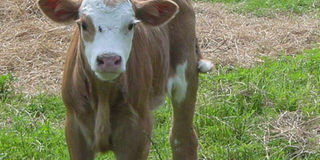Your animal doctor

A healthy calf in a farm. Red urine in calves, is a sign of several possible conditions. FILE PHOTO | NMG
What you need to know:
- Water intoxication occurs when excessive quantities of water are ingested by very thirsty animals.
- Failure to provide calves with both water and salts from as early as two weeks of age to weaning, also predisposes them.
- Contact Kenya Marine and Fisheries Research Institute located in Sagana, they are best suited to train you on fish farming.
- Prevention of water intoxication can be achieved by provision of mineral salts and water ad libitum.
My calf is passing red urine
My three-month-old calf is passing out red urine. Is this a sign of a serious attack?
Mugambi, Meru
Red urine or red water as it is sometimes referred to, is a sign of several possible conditions: poisoning by a plant called Bracken fern, a tick-borne disease called Babesiosis or water intoxication.
In your case, we are likely to be dealing with the last condition.
Water intoxication occurs when excessive quantities of water are ingested by very thirsty animals. It commonly occurs in animals that have been subjected to severe exercise or high environmental temperatures.
In cattle, the condition occurs in all ages, but it is more common among calves 2–10 months of age.
A number of factors predispose calves to water intoxication. Young bucket-fed calves usually drink excessive quantities of water if offered to them in the manner in which they usually receive their milk.
Chronic subclinical dehydration accompanied by increased environmental temperature, exercise or increased body water loss due to diarrhoea or fever also predisposes calves to water intoxication.
Failure to provide calves with both water and salts from as early as two weeks of age to weaning, also predisposes them.
Prevention of water intoxication can be achieved by provision of mineral salts and water ad libitum (free choice) to calves from as early as two weeks of age.
****
Mineral deficiency in cows
What causes black dairy cows to start changing colour to brownish?
Isaac Kimani, Murang’a
This is likely to be mineral deficiency. Supplement your cows with Intromin mineral blocks fed free choice.
****
I want to be a fish farmer
I am a small-scale farmer and I am interested in fish farming. Please guide me on how to go about it.
Bernard Macua
Kindly contact Kenya Marine and Fisheries Research Institute located in Sagana, they are best suited to train you on fish farming and also supply you with fingerlings.
****
Market for sheep and goats
I have 216 goats and 84 sheep. Please advise me how I can get a market for them?
Menya Mwambeu, Nairobi
You may contact: Neema Livestock Slaughter and Investment Company Ltd (NLSIC) of P.O Box 8267 – 00610, Eastleigh – Nairobi, Kenya.
Located at Lucky Summer, Tel contact: 0722803223 / 0721589216 / 0725878713, Email: [email protected]
****
Hen with ‘weird’ behaviour
My hen nicknamed police is now roughly two years of age. The nickname comes from its cuplike head aspect on the head.
The behaviour and physical appearance are unique, therefore, has raised eyebrows in my family. Physically, the hen looks like a cock. Behaviourally, it is a peace maker so to speak.
Whenever other fellow hens or cocks fight, “police” steps in by attacking but in the event one persist in the fight, it picks up the fight, attacking the aggressor.
Recently, it hatched six chicks but funnily one of the chicks has four ‘legs’. This abnormal chick has been received with different opinion from both neighbours and the family. Now, we are seeking research on the hen as we feel that it could be informative and educative to Kenyans.
Sam Ouma, Kisumu
This is likely to be the result of inbreeding where related birds are continuously bred. I believe the rest is perception and of course superstition.





